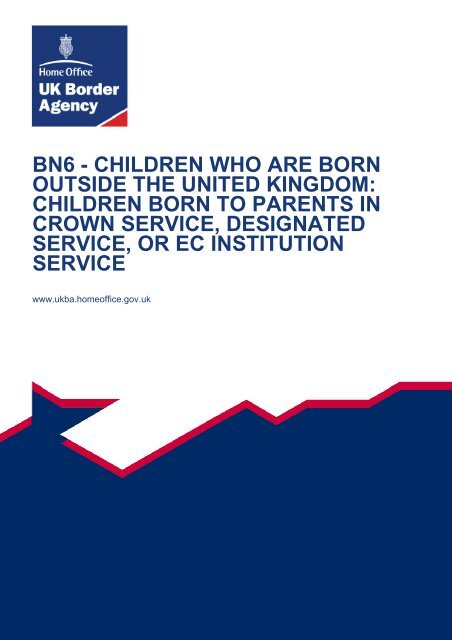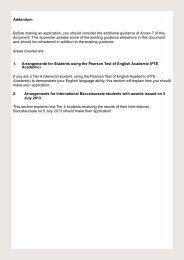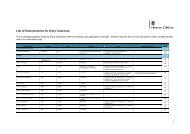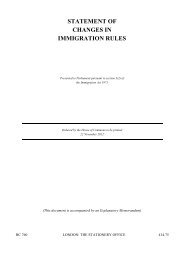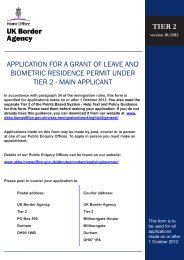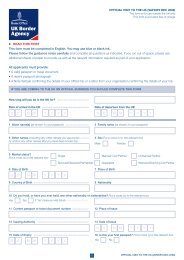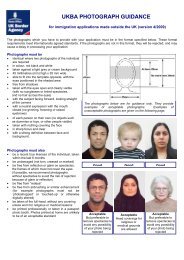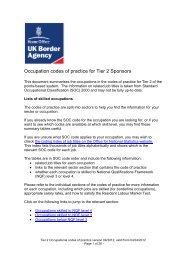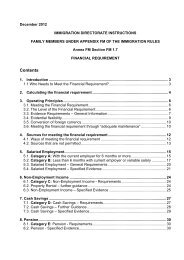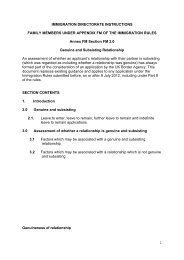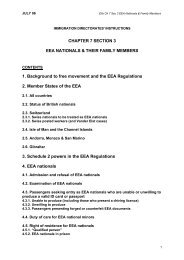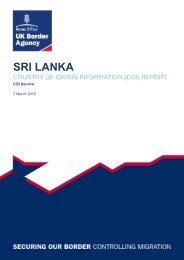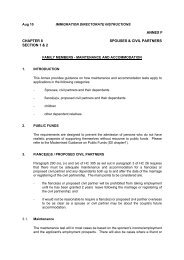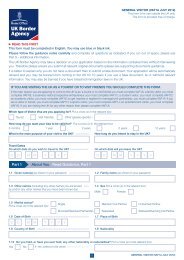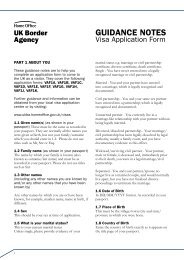BN6 - Children who are born outside the United - UK Border Agency ...
BN6 - Children who are born outside the United - UK Border Agency ...
BN6 - Children who are born outside the United - UK Border Agency ...
Create successful ePaper yourself
Turn your PDF publications into a flip-book with our unique Google optimized e-Paper software.
<strong>BN6</strong> - CHILDREN WHO ARE BORN<br />
OUTSIDE THE UNITED KINGDOM:<br />
CHILDREN BORN TO PARENTS IN<br />
CROWN SERVICE, DESIGNATED<br />
SERVICE, OR EC INSTITUTION<br />
SERVICE<br />
www.ukba.homeoffice.gov.uk
INFORMATION ABOUT BRITISH CITIZENSHIP - CHILDREN WHO ARE BORN OUTSIDE<br />
THE UNITED KINGDOM (OR OUTSIDE THE UNITED KINGDOM AND QUALIFYING<br />
TERRITORIES FROM 21 MAY 2002) TO PARENTS IN CROWN SERVICE, IN DESIGNATED<br />
SERVICE, OR IN SERVICE UNDER A EUROPEAN COMMUNITY INSTITUTION<br />
GENERAL<br />
1. This leaflet explains how children <strong>born</strong> abroad on or after 1 January 1983 may be British<br />
citizens when <strong>the</strong>y <strong>are</strong> <strong>born</strong> if <strong>the</strong>ir p<strong>are</strong>nts <strong>are</strong> British citizens and <strong>are</strong> serving <strong>outside</strong> <strong>the</strong><br />
<strong>United</strong> Kingdom (or, in certain circumstances, <strong>outside</strong> a qualifying territory):<br />
2<br />
• in Crown service (see paragraph 10), or<br />
• in designated service (see paragraph 11), or<br />
• in service under a European Community institution (see paragraph 12)<br />
The rules under which British citizen p<strong>are</strong>nts pass on <strong>the</strong>ir citizenship to children <strong>born</strong> abroad in<br />
o<strong>the</strong>r cases <strong>are</strong> explained in leaflet BN4, which you can get on our website or from <strong>the</strong> Home<br />
Office at <strong>the</strong> address in paragraph 15.<br />
NB. In this leaflet:<br />
• <strong>the</strong> “<strong>United</strong> Kingdom” means England, Scotland, Wales, Nor<strong>the</strong>rn Ireland, <strong>the</strong> Channel<br />
Islands and <strong>the</strong> Isle of Man<br />
• <strong>the</strong> “qualifying territories” mean <strong>the</strong> British overseas territories (see Note A) except for <strong>the</strong><br />
Sovereign Base Areas of Akrotiri and Dhekelia<br />
• unless o<strong>the</strong>rwise indicated, any reference to “p<strong>are</strong>nt” means:<br />
<strong>Children</strong> <strong>born</strong> before 1 July 2006<br />
• <strong>the</strong> mo<strong>the</strong>r (if <strong>the</strong> child was <strong>born</strong> on or after 1 January 1983) – before 1983, women were<br />
not able to pass on citizenship to <strong>the</strong>ir children<br />
• <strong>the</strong> fa<strong>the</strong>r (but only if he was married to <strong>the</strong> mo<strong>the</strong>r)<br />
NB. If <strong>the</strong> p<strong>are</strong>nts were not married when <strong>the</strong> child was <strong>born</strong>, but <strong>the</strong>n get married, <strong>the</strong><br />
marriage might legitimate <strong>the</strong> child’s birth. If it does, <strong>the</strong> child would become a British<br />
citizen (and would be regarded as having been one from birth) if <strong>the</strong> fa<strong>the</strong>r was a British<br />
citizen (or settled) when <strong>the</strong> child was <strong>born</strong>. <strong>Children</strong> of a void marriage may also, in<br />
some circumstances, be treated as legitimate.<br />
<strong>Children</strong> <strong>born</strong> on or after 1 July 2006<br />
• <strong>the</strong> mo<strong>the</strong>r (i.e. <strong>the</strong> woman <strong>who</strong> gives birth to <strong>the</strong> child)<br />
• <strong>the</strong> fa<strong>the</strong>r if:<br />
a. he is married to <strong>the</strong> mo<strong>the</strong>r at <strong>the</strong> time of <strong>the</strong> birth; or<br />
b. he is treated as <strong>the</strong> fa<strong>the</strong>r under section 28 of <strong>the</strong> Human Fertilisation and<br />
Embryology Act 1990; or<br />
c. (if nei<strong>the</strong>r (a) nor (b) apply) he can satisfy certain requirements as regards proof of<br />
paternity – i.e. he is named as <strong>the</strong> fa<strong>the</strong>r on a birth certificate issued within 1 year of <strong>the</strong><br />
child’s birth or he can satisfy <strong>the</strong> Home Secretary that he is <strong>the</strong> fa<strong>the</strong>r of <strong>the</strong> child (by<br />
means of DNA test results, court orders or o<strong>the</strong>r relevant evidence)<br />
THE DIFFERENCE BETWEEN BEING A BRITISH CITIZEN OTHERWISE THAN BY<br />
DESCENT AND A BRITISH CITIZEN BY DESCENT<br />
2. Every British citizen is ei<strong>the</strong>r a British citizen o<strong>the</strong>rwise than by descent or a British<br />
citizen by descent. The difference determines <strong>the</strong> way in which he or she can pass on British<br />
citizenship to children <strong>born</strong> <strong>outside</strong> <strong>the</strong> <strong>United</strong> Kingdom.
Generally speaking, British citizens o<strong>the</strong>rwise than by descent can pass on British citizenship<br />
automatically to <strong>the</strong>ir children <strong>who</strong> were <strong>born</strong> abroad on or after 1 January 1983; apart from<br />
British citizens in <strong>the</strong> types of service mentioned in paragraph 1, British citizens by descent can<br />
not.<br />
The children of British citizens in <strong>the</strong> types of service mentioned in paragraph 1 will be British<br />
citizens o<strong>the</strong>rwise than by descent.<br />
Fur<strong>the</strong>r information about British citizenship by descent and o<strong>the</strong>rwise than by descent is in<br />
leaflet BN4, which is available on our website or from <strong>the</strong> Nationality Quality and Enquiry Team<br />
or British Post abroad (see paragraph 15).<br />
CHILDREN BORN OUTSIDE THE UNITED KINGDOM BETWEEN 1 JANUARY 1983 AND 20<br />
MAY 2002 TO A PARENT SERVING OUTSIDE THE UNITED KINGDOM IN CROWN,<br />
DESIGNATED OR EUROPEAN COMMUNITY SERVICE<br />
3. A child <strong>who</strong> was <strong>born</strong> <strong>outside</strong> <strong>the</strong> <strong>United</strong> Kingdom between 1 January 1983 and 20 May<br />
2002 is a British citizen if, at <strong>the</strong> time of <strong>the</strong> birth, ei<strong>the</strong>r p<strong>are</strong>nt was:<br />
3<br />
• a British citizen; and<br />
• in Crown, designated European Community service (see paragraphs 10-12); and<br />
• recruited (see paragraph 13) to that service:<br />
o in <strong>the</strong> <strong>United</strong> Kingdom in <strong>the</strong> case of Crown or designated service, or<br />
o in a country which was at <strong>the</strong> time of recruitment a member of <strong>the</strong> European<br />
Union (see Note B) in <strong>the</strong> case of service with a Community institution<br />
CHILDREN BORN OUTSIDE THE UNITED KINGDOM AND THE QUALIFYING<br />
TERRITORIES ON OR AFTER 21 MAY 2002 TO A PARENT SERVING OUTSIDE THE<br />
UNITED KINGDOM AND OUTSIDE THE QUALIFYING TERRITORIES IN CROWN,<br />
DESIGNATED OR EUROPEAN COMMUNITY SERVICE<br />
4. A child <strong>who</strong> is <strong>born</strong> <strong>outside</strong> <strong>the</strong> <strong>United</strong> Kingdom and <strong>the</strong> qualifying territories on or after<br />
21 May 2002 is a British citizen if, at <strong>the</strong> time of <strong>the</strong> birth, ei<strong>the</strong>r p<strong>are</strong>nt is:<br />
• a British citizen; and<br />
• in Crown, designated or European Community service (see paragraphs 10-12); and<br />
• recruited (see paragraph 13) to that service:<br />
o in <strong>the</strong> <strong>United</strong> Kingdom or a qualifying territory in <strong>the</strong> case of Crown or designated<br />
service, or<br />
o in a country which was at <strong>the</strong> time of recruitment a member of <strong>the</strong> European Union<br />
(see Note B) in <strong>the</strong> case of service with a Community institution<br />
5. A child described in paragraph 3 or 4 will be a British citizen o<strong>the</strong>rwise than by descent<br />
and so will automatically pass on British citizenship to any children he or she has <strong>outside</strong> <strong>the</strong><br />
<strong>United</strong> Kingdom and <strong>the</strong> qualifying territories in <strong>the</strong> future.<br />
6. You do not need to take any official action when your child is <strong>born</strong> to confirm your child’s<br />
status. But if you want, for example, to apply for a British passport for your child, you may need<br />
to produce certain documents. This is explained in more detail in paragraph 14.
BRITISH CITIZENS BORN ABROAD BEFORE 1 JANUARY 1983 TO FATHERS SERVING<br />
OUTSIDE THE UNITED KINGDOM IN CROWN, DESIGNATED OR EUROPEAN<br />
COMMUNITY SERVICE<br />
7. A person <strong>born</strong> <strong>outside</strong> <strong>the</strong> <strong>United</strong> Kingdom before 1 January 1983 and <strong>who</strong> became a<br />
British citizen on that date (see Note C) is a British citizen o<strong>the</strong>rwise than by descent if, at <strong>the</strong><br />
time of <strong>the</strong> person’s birth, his or her fa<strong>the</strong>r was:<br />
4<br />
• serving <strong>outside</strong> <strong>the</strong> <strong>United</strong> Kingdom in Crown service (see paragraph 10), in service<br />
which at any time is designated by <strong>the</strong> Home Secretary (see paragraph 11), or in service<br />
under a European Community institution (see paragraph 12); and<br />
• recruited (see paragraph 13) to that service:<br />
o in <strong>the</strong> <strong>United</strong> Kingdom in <strong>the</strong> case of Crown or designated service, or<br />
o in a country which was at <strong>the</strong> time of recruitment a member of <strong>the</strong> European Union<br />
(see Note B) in <strong>the</strong> case of service with a Community institution<br />
A person <strong>who</strong> is a British citizen o<strong>the</strong>rwise than by descent can automatically pass on British<br />
citizenship to any children he or she may have in future <strong>outside</strong> <strong>the</strong> <strong>United</strong> Kingdom and <strong>the</strong><br />
qualifying territories.<br />
Where <strong>the</strong>ir fa<strong>the</strong>r was serving <strong>outside</strong> <strong>the</strong> <strong>United</strong> Kingdom in service which has been<br />
designated since 1 January 1983, British citizens <strong>who</strong> were <strong>born</strong> abroad before 1 January 1983<br />
will be British citizens o<strong>the</strong>rwise than by descent from <strong>the</strong> date <strong>the</strong>ir fa<strong>the</strong>r’s service was<br />
designated. They can automatically pass on British citizenship to any children <strong>the</strong>y may have<br />
on or after <strong>the</strong> date of designation.<br />
REGISTRATION OF CHILDREN<br />
8. A child under 18 <strong>who</strong> does not become a British citizen at birth may have a right to be<br />
registered as a British citizen if, at <strong>the</strong> time of <strong>the</strong> birth:<br />
• one of <strong>the</strong> child’s p<strong>are</strong>nts was a British citizen by descent; or<br />
• <strong>the</strong> child was stateless (and has remained stateless)<br />
9. A child under 18 <strong>who</strong> does not have <strong>the</strong> right to be registered as a British citizen may still<br />
be registered if <strong>the</strong> Home Secretary agrees. It is not possible to set out all of <strong>the</strong> circumstances<br />
in which <strong>the</strong> Home Secretary might be prep<strong>are</strong>d to allow registration. However, he will normally<br />
take into account:<br />
• <strong>the</strong> child’s connections with <strong>the</strong> <strong>United</strong> Kingdom<br />
• where <strong>the</strong> child’s future is likely to lie<br />
• <strong>the</strong> p<strong>are</strong>nts’ views and nationality<br />
• <strong>the</strong> child’s and <strong>the</strong> p<strong>are</strong>nts’ immigration position<br />
• (if <strong>the</strong> child is aged 10 or over) <strong>the</strong> child’s character<br />
• (in <strong>the</strong> case of an older child, particularly one <strong>who</strong> is approaching <strong>the</strong> age of 18) <strong>the</strong><br />
length of time he or she has lived in <strong>the</strong> <strong>United</strong> Kingdom<br />
Fur<strong>the</strong>r information about how a child can be registered as a British citizen is contained in leaflet<br />
BN4 (or, if <strong>the</strong> child is stateless, leaflet BN5) which you can get on our website or from <strong>the</strong><br />
Nationality Quality and Enquiry Team or British Post abroad (see paragraph 15). If you want to<br />
apply for your child to be registered as a British citizen, you can get an application form on our<br />
website or by telephoning 0117 344 1462.
MEANING OF “CROWN SERVICE”<br />
10. In this leaflet, “Crown service” means Crown service:<br />
5<br />
• under <strong>the</strong> <strong>United</strong> Kingdom Government (e.g. members of Her Majesty’s Forces, <strong>the</strong><br />
Home Civil Service and Her Majesty’s Diplomatic Service), or<br />
• under <strong>the</strong> Nor<strong>the</strong>rn Ireland Government, or<br />
• under <strong>the</strong> Scottish Administration, or<br />
under <strong>the</strong> Welsh Assembly Government (from 6 November 2009), or<br />
• under <strong>the</strong> governments of <strong>the</strong> qualifying territories (since 21 May 2002)<br />
“Crown service” does not include service under <strong>the</strong> governments of former British overseas<br />
territories, Commonwealth countries of which Her Majesty <strong>the</strong> Queen is Head of State or what<br />
used to be self-governing dominions (but such service may be treated as designated service –<br />
see paragraph 11(a) below).<br />
If you <strong>are</strong> not sure whe<strong>the</strong>r you <strong>are</strong> in Crown service, you should write to your employer for<br />
confirmation.<br />
MEANING OF “DESIGNATED SERVICE”<br />
11. This is a service which <strong>the</strong> Home Secretary has decl<strong>are</strong>d to be closely associated with<br />
<strong>the</strong> overseas activities of <strong>the</strong> <strong>United</strong> Kingdom Government and, from 21 May 2002, <strong>the</strong><br />
overseas activities of <strong>the</strong> governments of <strong>the</strong> qualifying territories. The forms of service which<br />
have been designated by <strong>the</strong> Home Secretary, with <strong>the</strong> date when designation came into<br />
operation in each case, <strong>are</strong>:<br />
a. Service as:<br />
• an official administering <strong>the</strong> government of a British overseas territory (see Note A), <strong>the</strong><br />
Channel Islands or <strong>the</strong> Isle of Man<br />
• an official in <strong>the</strong> government of a British overseas territory, <strong>the</strong> Channel Islands of <strong>the</strong><br />
Isle of Man<br />
• a judge or a magistrate in a British overseas territory, <strong>the</strong> Channel Islands or <strong>the</strong> Isle of<br />
Man (from 1 January 1983).<br />
NB. This includes service before 1 January 1983 in a place which was, at that time, a British<br />
colony, protectorate, protected state, mandated territory, or trust territory.<br />
b. Crown service under <strong>the</strong> <strong>United</strong> Kingdom Government, under <strong>the</strong> Nor<strong>the</strong>rn Ireland<br />
Government or under <strong>the</strong> Scottish Administration, where <strong>the</strong> person is temporarily on<br />
secondment overseas (from 1 January 1983).<br />
c. Crown service under <strong>the</strong> government of a qualifying territory, where <strong>the</strong> person is<br />
temporarily on secondment overseas (from 16 June 2006).<br />
d. Overseas service by certain civilians <strong>who</strong> <strong>are</strong> subject to <strong>the</strong> Army Act 1955, <strong>the</strong> Air Force<br />
Act 1955 or <strong>the</strong> Naval Discipline Act 1957 (see Note D) (from 1 January 1983).<br />
e. Service under <strong>the</strong> North Atlantic Treaty Organisation (NATO) (from 1 January 1983).<br />
f. Service under <strong>the</strong> Commonwealth War Graves Commission (from 1 January 1983).<br />
g. Service under <strong>the</strong> British Council, as long as <strong>the</strong> employee is paid <strong>who</strong>lly from British<br />
Council funds (from 1 January 1983).
h. Service under <strong>the</strong> British Tourist Authority (from 1 January 1983).<br />
i. Service under <strong>the</strong> Medical Research Council (from 21 December 1984).<br />
j. Service under <strong>the</strong> Science and Engineering Research Council (from 21 December 1984)<br />
or under <strong>the</strong> Engineering and Physical Sciences Research Council, <strong>the</strong> Biotechnology and<br />
Biological Sciences Research Council or <strong>the</strong> Particle Physics and Astronomy Research Council<br />
(from 1 April 1994).<br />
k. Service under <strong>the</strong> Natural Environment Research Council (from 21 December 1984).<br />
l. Service under <strong>the</strong> Agricultural and Food Research Council (from 30 April 1987) or under<br />
<strong>the</strong> Biotechnology and Biological Sciences Research Council (from 1 April 1994).<br />
m. Service on secondment from any of <strong>the</strong> Research Councils listed at (i) to (l) above (from<br />
30 April 1987).<br />
n. Service under <strong>the</strong> European Patent Office (from 16 February 1990)<br />
o. Service under <strong>the</strong> Customs Co-operation Council (from 1 April 1994).<br />
p. Service under <strong>the</strong> European Conference of Ministers of Transport (from 1 April 1995).<br />
q. Service under <strong>the</strong> International Energy <strong>Agency</strong> (from 1 April 1995).<br />
r. Service under <strong>the</strong> Organisation for Economic Co-operation and Development (from 1<br />
April 1995).<br />
s. Service under, or on secondment from, <strong>the</strong> Council for <strong>the</strong> Central Laboratory of <strong>the</strong><br />
Research Councils (from 1 April 1995).<br />
t. Service under an international organisation (not mentioned above) of which <strong>the</strong> <strong>United</strong><br />
Kingdom is a member (from 16 June 2006).<br />
u. Service under <strong>the</strong> Welsh Assembly Government (from 14 February 2008 to 5 November 2009).<br />
If you <strong>are</strong> not sure whe<strong>the</strong>r you <strong>are</strong> in designated service, you should write to your employer for<br />
confirmation.<br />
MEANING OF “EUROPEAN COMMUNITY SERVICE”<br />
12. The following categories of people <strong>are</strong> regarded as being in service under a European<br />
Community institution for <strong>the</strong> purpose of <strong>the</strong> British Nationality Act 1981:<br />
Members, officials and o<strong>the</strong>r servants working for:<br />
• <strong>the</strong> European Commission<br />
• <strong>the</strong> Council of Ministers<br />
• <strong>the</strong> European Parliament<br />
• <strong>the</strong> European Court of Justice (e.g. Judges, Advocates General, <strong>the</strong> Registrar and<br />
Assistant Rapporteurs)<br />
• <strong>the</strong> Court of Auditors<br />
• <strong>the</strong> Economic and Social Committee<br />
• <strong>the</strong> Committee of <strong>the</strong> Regions<br />
If you <strong>are</strong> not sure whe<strong>the</strong>r you <strong>are</strong> in service under a European Community institution, you<br />
6<br />
should write to your employer for confirmation.
RECRUITMENT<br />
13. Officers in Her Majesty’s Forces <strong>are</strong> all recruited in <strong>the</strong> <strong>United</strong> Kingdom. O<strong>the</strong>r ranks <strong>are</strong><br />
regarded as having been recruited where <strong>the</strong>y go through <strong>the</strong> process of attestation. Members<br />
of <strong>the</strong> Home Civil Service and of Her Majesty’s Diplomatic Service <strong>are</strong> regarded as having been<br />
recruited in <strong>the</strong> <strong>United</strong> Kingdom.<br />
If you <strong>are</strong> in one of <strong>the</strong> types of service listed in paragraph 1, and you <strong>are</strong> not sure where you<br />
were recruited, you should write to your employer for confirmation.<br />
BRITISH PASSPORTS AND HOW TO ESTABLISH YOUR CHILD'S CITIZENSHIP<br />
14. If your child became a British citizen automatically at birth under <strong>the</strong> arrangements<br />
described in paragraph 3 or 4, you will need to produce certain documents if you want to get a<br />
passport for your child.<br />
These documents will vary depending on <strong>the</strong> circumstances, but you will normally be asked to<br />
produce:<br />
7<br />
• your child’s birth certificate showing details of <strong>the</strong> p<strong>are</strong>nts;<br />
• your marriage certificate;<br />
• evidence that when your child was <strong>born</strong> <strong>the</strong> relevant p<strong>are</strong>nt was a British citizen (this will<br />
normally be a British passport) ; and<br />
• evidence that <strong>the</strong> relevant p<strong>are</strong>nt was:<br />
o serving in Crown, designated or European Community institution service, and<br />
o recruited in <strong>the</strong> <strong>United</strong> Kingdom (or, if your child was <strong>born</strong> on or after 21 May<br />
2002, a qualifying territory) in <strong>the</strong> case of Crown or designated service, or in a<br />
country which, at <strong>the</strong> time of recruitment, was a member of <strong>the</strong> European Union in<br />
<strong>the</strong> case of employment with a European Community institution – this will normally<br />
be an official letter from your employer confirming your employment and where<br />
you were recruited<br />
Paragraph 15 tells you where you should send your application for a British passport,<br />
depending on where you <strong>are</strong>.<br />
ADDRESSES FOR ENQUIRIES<br />
15. If you <strong>are</strong> in England, Scotland, Wales or Nor<strong>the</strong>rn Ireland, and have any questions<br />
about this leaflet or about being a British citizen, please contact:<br />
Home Office Department 2<br />
Nationality Quality and Enquiry Team<br />
<strong>Border</strong> and Immigration <strong>Agency</strong><br />
PO Box 306<br />
Liverpool L2 OQN.<br />
Telephone: 0845 010 5200<br />
If you have any questions about British passports, you can obtain fur<strong>the</strong>r advice and information<br />
on <strong>the</strong> Identity and Passport Service website at www.passport.gov.uk or by contacting <strong>the</strong> 24hour<br />
Passport Adviceline on 0870 521 0410. If you <strong>are</strong> not in England, Scotland, Wales or<br />
Nor<strong>the</strong>rn Ireland, you can also contact your ne<strong>are</strong>st British Post abroad (see below).
If you have any questions about this leaflet, being a British citizen and British passports, please<br />
contact:<br />
• <strong>the</strong> Lieutenant-Governor, if you <strong>are</strong> in <strong>the</strong> Channel Islands or <strong>the</strong> Isle on Man<br />
• <strong>the</strong> British Embassy or Consulate, if you <strong>are</strong> in a foreign country or Ireland<br />
• <strong>the</strong> British High Commission, if you <strong>are</strong> in a Commonwealth country<br />
• <strong>the</strong> Governor, if you <strong>are</strong> in a British overseas territory<br />
NOTES<br />
A. The British overseas territories <strong>are</strong> what, before 26 February 2002, were called British<br />
dependent territories.<br />
The British overseas territories <strong>are</strong> currently: Anguilla, Bermuda, British Antarctic Territory,<br />
British Indian Ocean Territory, Cayman Islands, Falkland Islands, Gibraltar, Montserrat, Pitcairn,<br />
Henderson, Ducie and Oeno Islands, St Helena and Dependencies, South Georgia and <strong>the</strong><br />
South Sandwich Islands, <strong>the</strong> Sovereign Base Areas or Akrotiri and Dhekelia, Turks and Caicos<br />
Islands, and Virgin Islands.<br />
B. The following countries <strong>are</strong> currently members of <strong>the</strong> European Union: Austria, Belgium,<br />
Bulgaria, Cyprus, Czech Republic, Denmark, Estonia, Finland, France, Germany, Greece,<br />
Hungary, Ireland, Italy, Latvia, Lithuania, Luxembourg, Malta, Ne<strong>the</strong>rlands, Poland, Portugal,<br />
Romania, Slovakia, Slovenia, Spain, Sweden and <strong>the</strong> <strong>United</strong> Kingdom.<br />
C. Generally speaking, a person became a British citizen on 1 January 1983 if, on 31<br />
December 1982, he or she was a citizen of <strong>the</strong> <strong>United</strong> Kingdom and Colonies <strong>who</strong> had <strong>the</strong> right<br />
of abode through his or her own (or a p<strong>are</strong>nt’s or a grandp<strong>are</strong>nt’s) birth, legal adoption,<br />
naturalisation or registration in <strong>the</strong> <strong>United</strong> Kingdom or <strong>who</strong> had lived in <strong>the</strong> <strong>United</strong> Kingdom<br />
whilst a citizen of <strong>the</strong> <strong>United</strong> Kingdom and Colonies for five years at any time before 1 January<br />
1983 (and was not subject to restrictions under <strong>the</strong> immigration laws at <strong>the</strong> end of that five-year<br />
period).<br />
D. People subject to <strong>the</strong> Army and Air Force Acts 1955 and <strong>the</strong> Naval Discipline Act 1957<br />
include those working for <strong>the</strong> following organisations:<br />
8<br />
• Australia, New Zealand and Malaya Defence Organisation<br />
• Baghdad Pact Council<br />
• British Red Cross Society<br />
• British Sailors’ Society<br />
• Central Treaty Organisation<br />
• Council of Voluntary Welf<strong>are</strong> Work, which includes:<br />
1. Catholic Women's League<br />
2. Church Army<br />
3. Church of England Soldiers’, Sailors’ and Airmen’s Clubs<br />
4. Church of Scotland Committee on Hut and Canteen Work for HM Forces<br />
5. Methodist Church Forces’ Centres<br />
6. Mission to Mediterranean Garrisons<br />
7. Royal Sailors’ Rests<br />
8. Salvation Army<br />
9. Sandes’ Soldiers’ and Airmen’s Homes<br />
10. Toc H<br />
11. YMCA<br />
12. YWCA<br />
• Malcolm Clubs
9<br />
• Missions to Seamen<br />
• Navy, Army and Air Force Institutes (NAAFI)<br />
• Royal Naval Film Corporation<br />
• Royal Naval Lay Readers’ Society<br />
• Services Sound and Vision Corporation (including British Forces Broadcasting Service)<br />
• Soldiers’ and Airmen’s Scripture Readers’ Association<br />
• Soldiers’, Sailors’ and Airmen’s Families Association (SSAFA)<br />
• South-East Asia Collective Defence Treaty Organisation (SEATO)<br />
• Venerable Order of <strong>the</strong> Hospital of St John of Jerusalem<br />
• Women's Royal Voluntary Service (WRVS)<br />
It also includes <strong>the</strong> following organisations (but only from 1 January 1983 until 30 September<br />
1988):<br />
• Combined Services Entertainments<br />
• Forces Help Society and Lord Roberts Workshops<br />
• Services Central Book Depot<br />
• St Andrews’ Ambulance Association<br />
This list may change from time to time.<br />
The law covering British citizenship and designated service is in <strong>the</strong> British Nationality<br />
Act 1981 and <strong>the</strong> Regulations and Orders made under it. The information given here is<br />
only a brief guide to <strong>the</strong> law and to <strong>the</strong> Home Secretary’s policy. It is not a complete<br />
statement of ei<strong>the</strong>r <strong>the</strong> law or policy.


